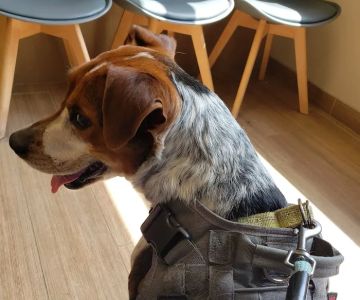Post-Surgery Care for Pets: Ensuring a Smooth Recovery
When your pet undergoes surgery, it can be a stressful time for both the animal and their owners. However, proper post-surgery care is essential to ensuring your pet's recovery and preventing complications. As a pet owner, it's crucial to understand the necessary steps to care for your pet after surgery to make sure they heal properly and quickly. In this article, we’ll discuss the key aspects of post-surgery care for pets, common mistakes to avoid, and tips for ensuring a smooth and successful recovery process for your furry friend.
1. Understanding the Importance of Post-Surgery Care for Pets
After surgery, your pet's body needs time to heal. Just like humans, animals require proper care and attention to avoid infections, manage pain, and ensure that they don’t do anything that could hinder the healing process. Post-surgery care for pets is critical not only for comfort but also for preventing serious complications such as infections or improper healing of surgical sites.
The first few days and weeks after surgery are the most critical, as pets are often groggy from anesthesia and may not understand the limits their body has. Your pet will be relying on you for comfort, attention, and to follow your veterinarian’s recommendations. Whether it’s a minor procedure like a dental cleaning or a more involved surgery like a spay or neuter, your care plays a large role in helping them heal effectively.
2. Following Your Veterinarian’s Instructions
The most important step in post-surgery care for your pet is following your veterinarian’s instructions to the letter. Your vet will provide detailed guidance on how to take care of your pet after surgery, and it’s essential to adhere to those instructions. These guidelines often include:
- Medication Administration: Your veterinarian will prescribe pain medications or antibiotics to prevent infection. Be sure to give the medications at the prescribed times and doses.
- Diet and Hydration: After surgery, your pet may not have much of an appetite. Offering light, easily digestible food and ensuring they stay hydrated is key to their recovery.
- Activity Restrictions: It’s important to keep your pet calm and prevent excessive movement to avoid putting strain on the surgical site. This means limiting playtime, walks, and jumping.
Sticking to these guidelines will help to minimize your pet's risk of post-surgical complications and improve their chances of a full recovery.
3. Monitoring the Surgical Site
One of the most important tasks in post-surgery care for pets is monitoring the surgical site for any signs of infection or abnormal healing. Look for redness, swelling, or discharge around the incision. If you notice any of these signs, contact your veterinarian immediately to prevent infection from setting in.
Ensure that your pet doesn’t lick or scratch at the incision. You may need to use an Elizabethan collar (also known as the "cone of shame") to prevent them from disturbing the site. In some cases, your vet might recommend a special bandage or dressing to protect the wound.
4. Providing Comfort and a Safe Healing Environment
After surgery, your pet may feel disoriented and anxious. Creating a calm, quiet space for them to rest is crucial for a smooth recovery. Ensure that they have a soft, comfortable bed in a quiet area where they won’t be disturbed by loud noises or other pets.
Spend time with your pet to provide emotional support. Petting, gentle talking, and staying close will help them feel more secure during their recovery period. It's also helpful to keep them indoors and away from other pets or children to prevent any accidental stress or injury.
5. Keeping Your Pet Hydrated and Well-Nourished
Proper nutrition and hydration are essential for your pet's healing. After surgery, they may not feel like eating much. Try offering small meals of bland, easy-to-digest food like boiled chicken or rice. If they’re still not eating, consider heating the food slightly or offering special food your vet recommends for post-surgery recovery.
Hydration is just as important. Make sure your pet has access to clean water at all times, and encourage them to drink. Some pets may need extra help, so you may want to offer water using a syringe if necessary (but only if your vet advises this). Keeping your pet well-nourished will support their immune system and help with healing.
6. Avoiding Common Post-Surgery Mistakes
While caring for your pet after surgery, there are a few common mistakes that owners often make that can delay recovery or cause complications. Some things to keep in mind include:
- Overexertion: Avoid allowing your pet to run or jump too soon after surgery. Rest is critical for healing, and too much activity can cause serious harm.
- Skipping Medications: It’s tempting to skip giving your pet their medications if they seem to be feeling better, but this can lead to setbacks. Always follow the vet’s instructions, even if your pet seems to be recovering quickly.
- Ignoring Warning Signs: If you notice any abnormal behaviors, such as lethargy, loss of appetite, or changes in the surgical site, don't wait. Contact your vet immediately for advice.
By avoiding these common mistakes and paying attention to your pet's needs, you can help ensure a smooth recovery process.
7. Conclusion: Your Role in Your Pet's Recovery
As a pet owner, your role in post-surgery care is essential to your pet’s recovery. By following your veterinarian’s instructions, monitoring your pet’s surgical site, providing a comfortable healing environment, and ensuring proper nutrition and hydration, you can help your pet heal more quickly and prevent complications. Always be vigilant and proactive during the recovery process, and don't hesitate to reach out to your vet with any questions or concerns.
For more expert advice on post-surgery care or if your pet needs a consultation, visit Hidden Brook Veterinary for the most professional care and services tailored to your pet’s specific needs.











